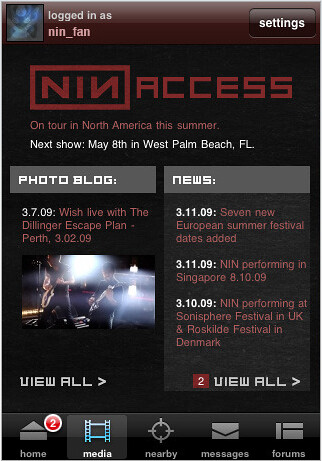This is important. Band/artist as brand as social network as mobile application.

As he's done before, Trent Reznor is showing the music business the way with the release of the (free) Nine Inch Nails (NIN) iPhone application. The application offers full integration with the NIN website, which is a thriving social network.
Sure, you might say that NIN has an extremely loyal fan base -- they do. You might say that NIN's fans are more pre-disposed to have an iPhone -- they are. Those are not good excuses.
The NIN brand just became the portal to something useful for the end user using the iPhone as a vector. Of course, this strategy is not limited to music artists and can be easily duplicated at very low marginal cost by any brand in the world. Why doesn't REI provide the application for my weather, snow reports, and tide tables? They sell all the stuff I want to use for the activities that are driven by those metrics. Why doesn't K2 provide me with an application that gives me ski run maps and allow me to plot my position with GPS? Every time I use the app, I'll associate the information with their brand and they can even send me messages about performance demos on the hill and/or sales at retailers in the village.
Specifically relating to music artists: NIN illustrates that artists can build a brand that fans are willing to opt into, to subscribe to. Reznor decided not to monetize the application, which is smart. Artists should monetize transparency and access and exclusive content; the media through which the fans reach those things that can be monetized should be free.
If I were a musician, I would simply copy everything that NIN and Reznor did. The incremental costs are very low (you could pull off a lot of the same stuff with free services like Ning) and he is highly successful.
Oh, and having your fans download a branded application to their phone is the ultimate in opt-in advertising.

As he's done before, Trent Reznor is showing the music business the way with the release of the (free) Nine Inch Nails (NIN) iPhone application. The application offers full integration with the NIN website, which is a thriving social network.
Sure, you might say that NIN has an extremely loyal fan base -- they do. You might say that NIN's fans are more pre-disposed to have an iPhone -- they are. Those are not good excuses.
The NIN brand just became the portal to something useful for the end user using the iPhone as a vector. Of course, this strategy is not limited to music artists and can be easily duplicated at very low marginal cost by any brand in the world. Why doesn't REI provide the application for my weather, snow reports, and tide tables? They sell all the stuff I want to use for the activities that are driven by those metrics. Why doesn't K2 provide me with an application that gives me ski run maps and allow me to plot my position with GPS? Every time I use the app, I'll associate the information with their brand and they can even send me messages about performance demos on the hill and/or sales at retailers in the village.
Specifically relating to music artists: NIN illustrates that artists can build a brand that fans are willing to opt into, to subscribe to. Reznor decided not to monetize the application, which is smart. Artists should monetize transparency and access and exclusive content; the media through which the fans reach those things that can be monetized should be free.
If I were a musician, I would simply copy everything that NIN and Reznor did. The incremental costs are very low (you could pull off a lot of the same stuff with free services like Ning) and he is highly successful.
Oh, and having your fans download a branded application to their phone is the ultimate in opt-in advertising.
No comments:
Post a Comment